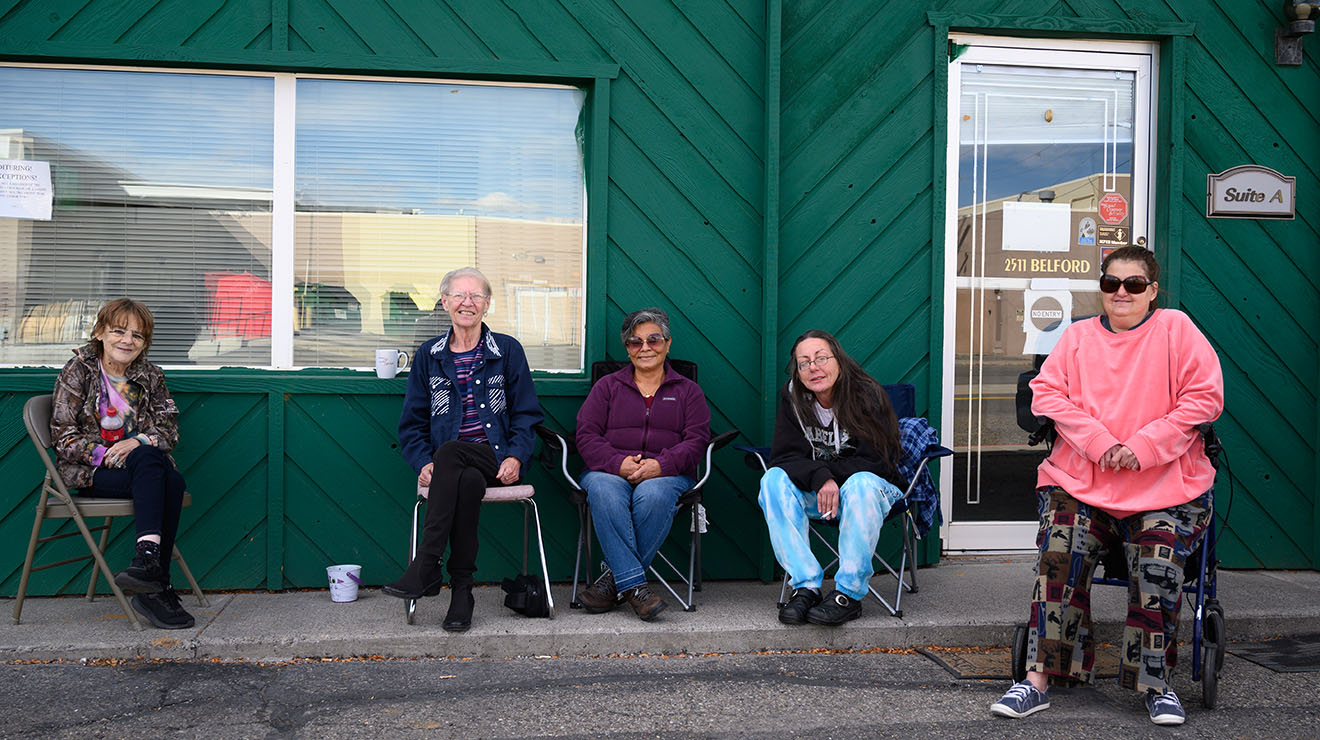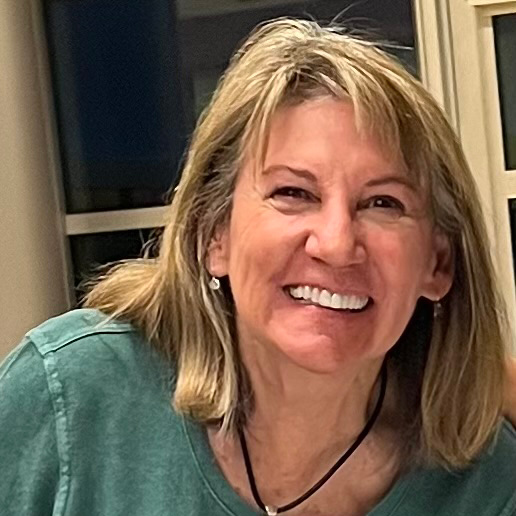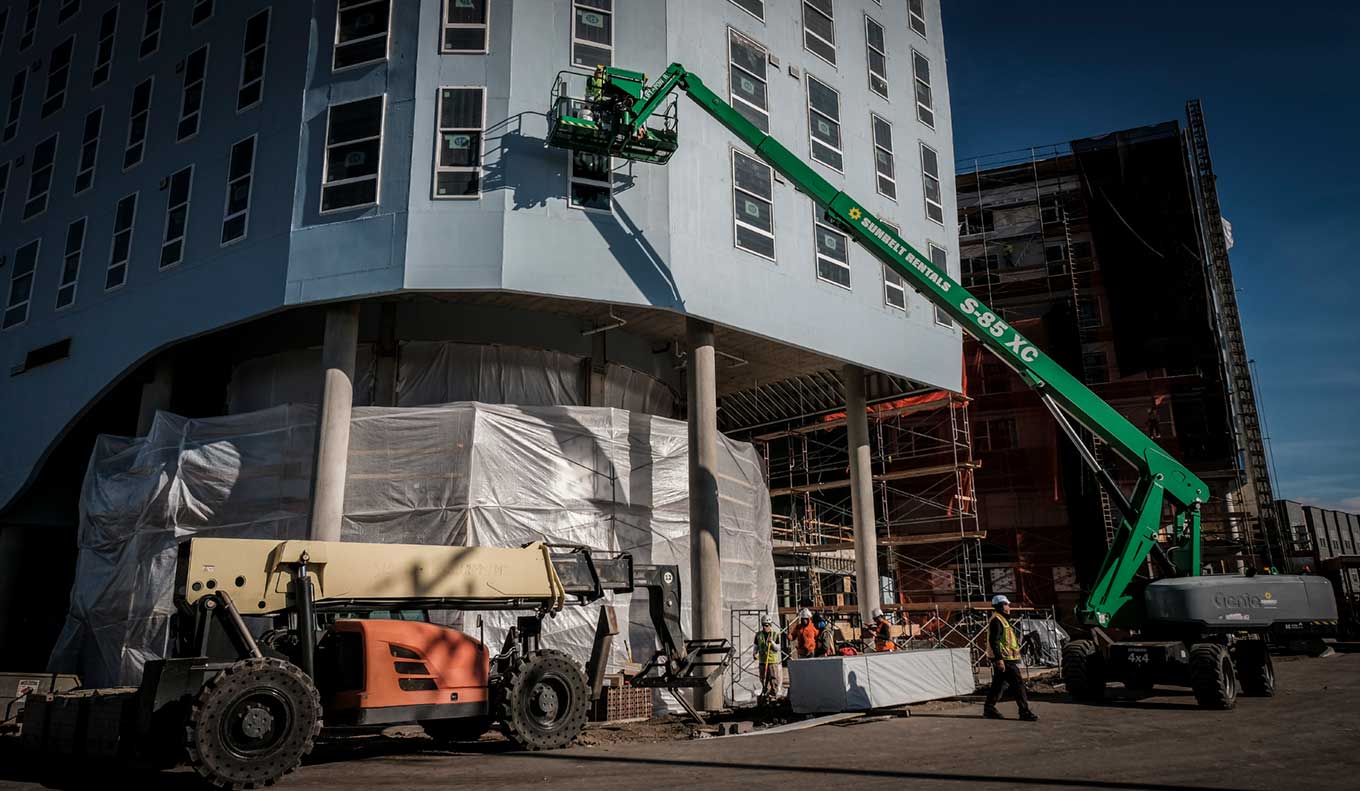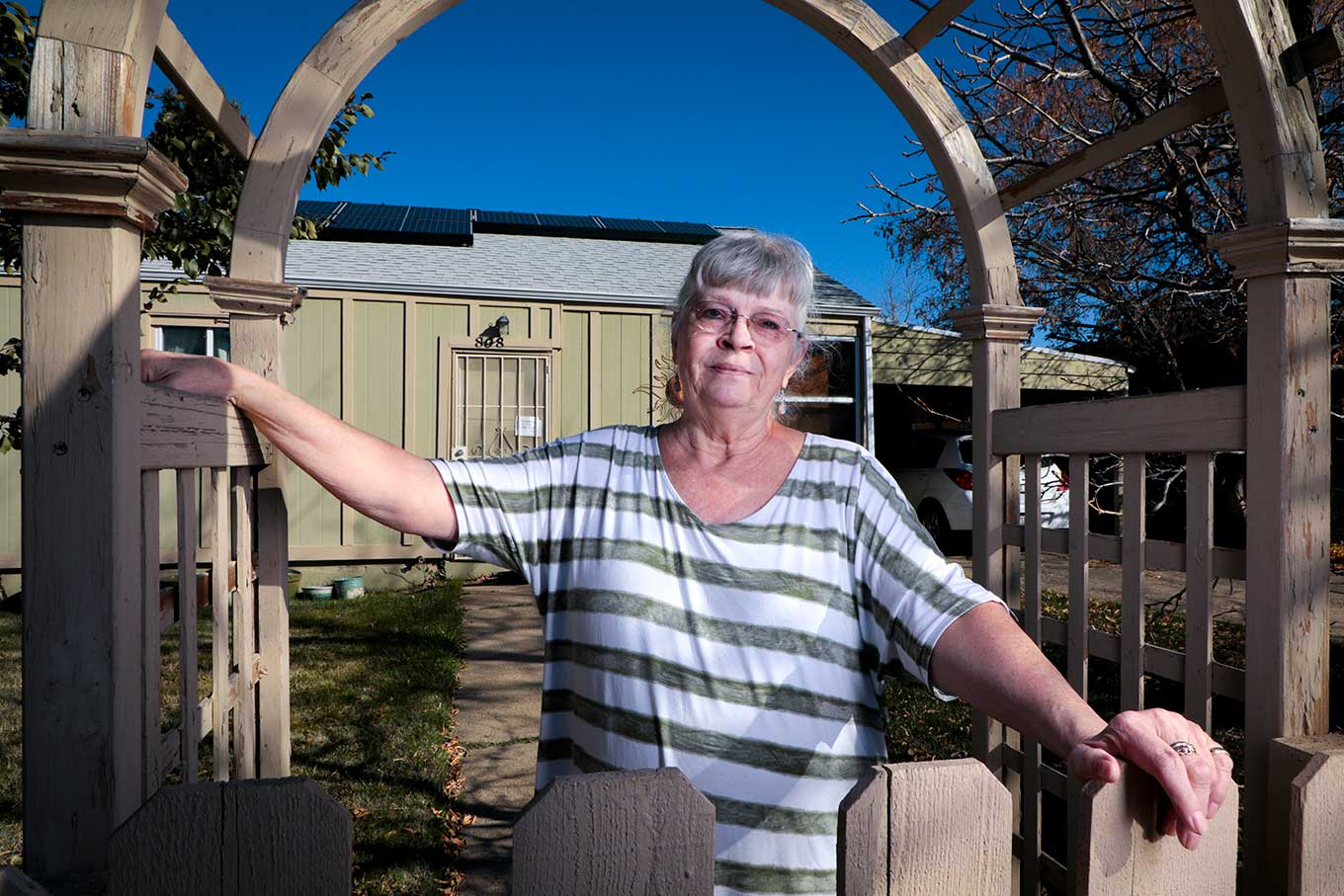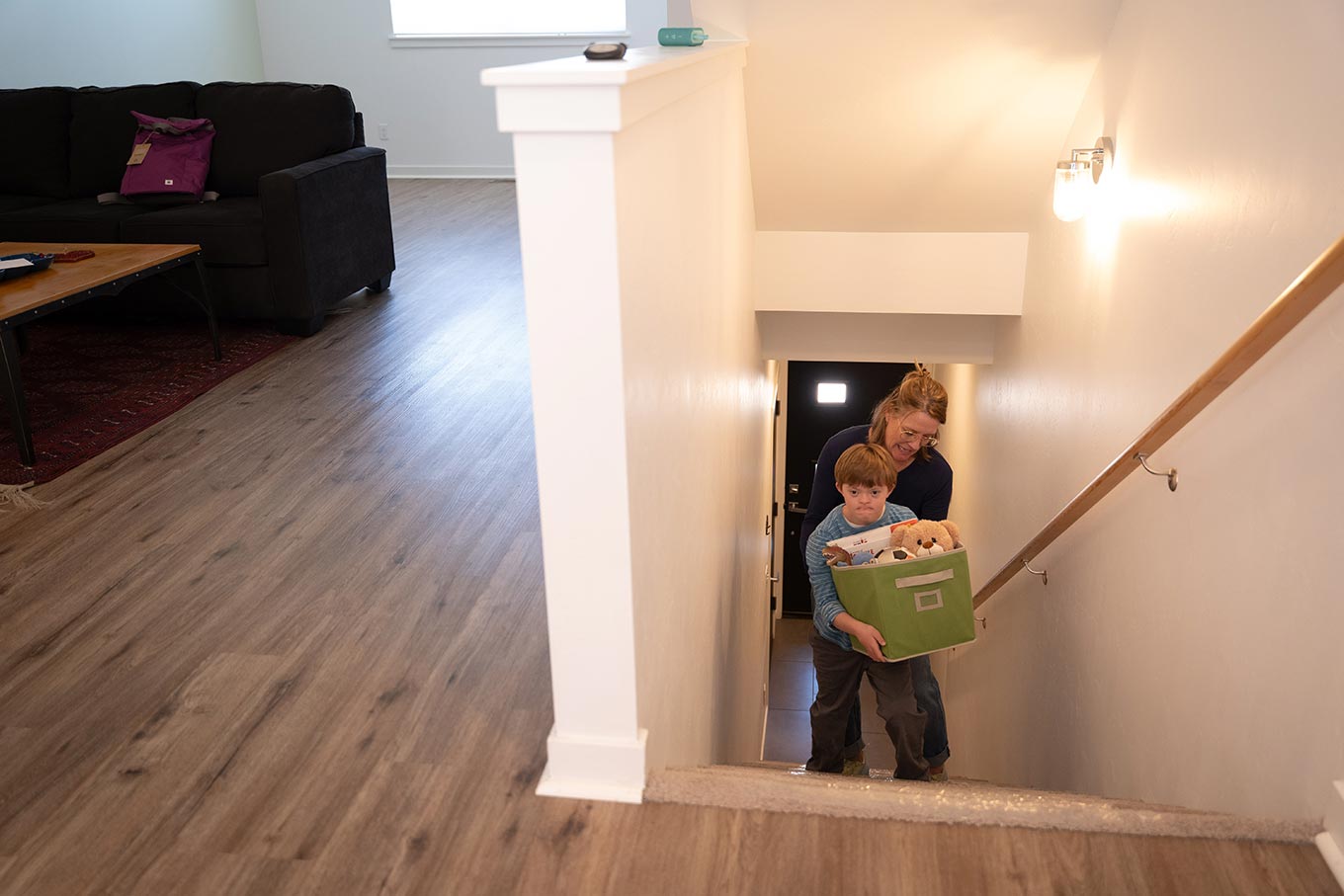It’s early fall in Grand Junction, and all eyes in a darkened room are fixed on a tiny old-fashioned TV, where the titular character of “Dr. Quinn, Medicine Woman” is battling a wealthy mining baron who has contaminated a western town’s water with mercury.
The women in this room comment and critique the fictional doctor’s spunk; they like it. Her ability to overcome all obstacles is inspiring to them. But they are grumbling a bit about this being the only show they can watch because of few channel choices. If they had their pick, all eyes would be on “The Golden Girls.”
Golden Girls is not just the name of their preferred TV sitcom rerun, though; it’s also the name of the two-year-old shelter for unhoused older women where they are all living at the moment. The Golden Girls shelter was created by The Joseph Center, a Grand Junction-based nonprofit that, for seven years, has been providing meals, medical aid and other support services for women with children who are experiencing homelessness.
The women here say they can relate to the fictional “Golden Girls” characters. As they ready themselves to go next door for a Joseph Center lunch, some of them take time to point out on “Golden Girls” posters who they imagine themselves to be if they were one of the characters: Blanche, Rose, Dorothy or Sophia?
“I like Blanche. She’s very comical,” says Valerie Azeltine, a rail-thin 73-year-old widow sporting a sparkling collection of costume-jewelry rings and bracelets.
Fellow resident Shannon Maxwell points at Rose: “I’m most like her. I love her.”
Nelda Tecata, another Golden Girls resident, burst into the room and declares that she is her own character—“a runaway grandma from L.A.” She came to Golden Girls after being threatened with arrest for sleeping on a sidewalk.
“Watch for me,” she says, as she whips a copy of the U.S. Constitution out of her backpack. “I am going to be running for president under the name Maw Jean.”
Golden Girls may be the only housing shelter specifically serving older women in Colorado. Alexis Witham, communications director for the Colorado Coalition for the Homeless, says she doesn’t know of another program like it. The coalition offers similar assistance across its 20 properties and multiple health care facilities, but does not have a program specific to this demographic.
The Joseph Center Director Mona Highline came up with the idea for the Golden Girls living space when she saw a table of “little old ladies” eating the free lunch at the Joseph Center. She likened their camaraderie to that of the fictional Golden Girls.
“I was worried for them. They were sleeping in their cars. They were afraid to go to shelters,” Highline says.
“These were women who had had some professional jobs. They had raised kids and grandkids. Then, life happened. They lost it all and they were caught with no place to go.”
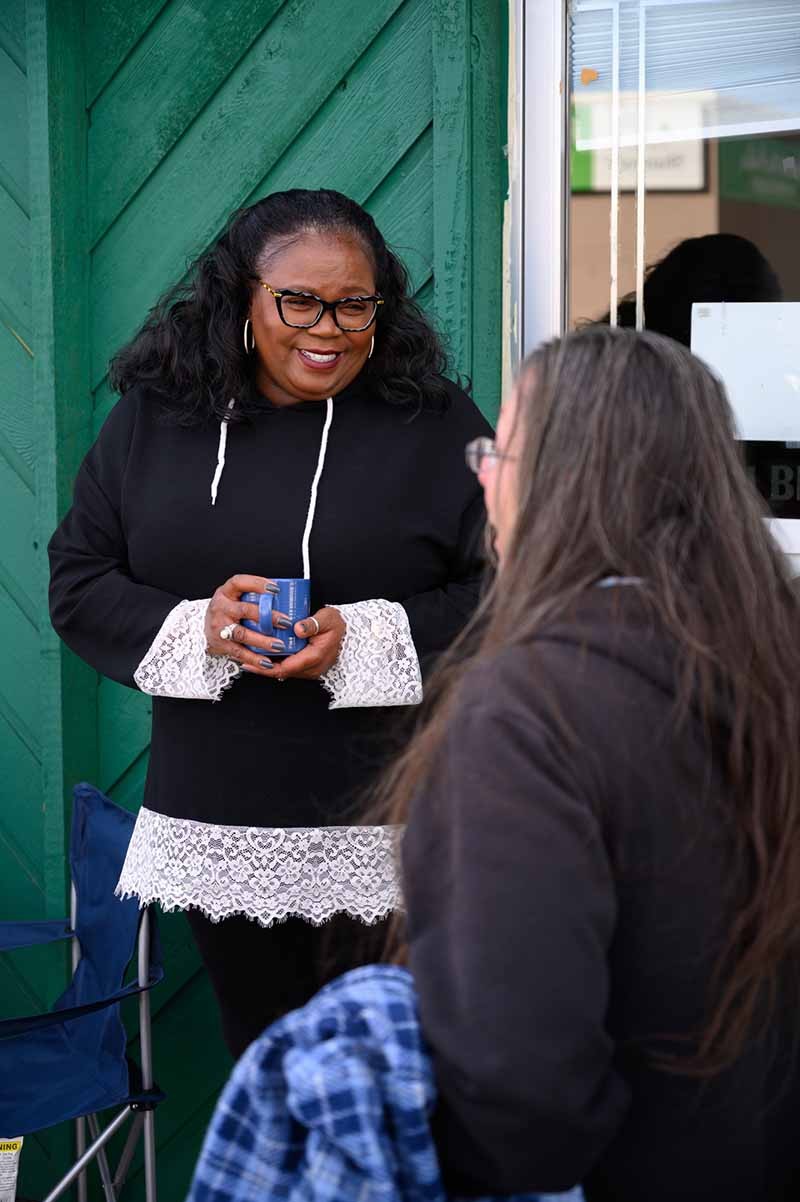
Mona Highline, the director of The Joseph Center (l.), talks to Rachel Snyder outside of the center’s Golden Girls shelter.
Highline says it’s obvious to her that the numbers of older women on the streets are growing. Evictions, low wages, increasing rent prices and more households headed by women have collectively increased the rate of homelessness among women, especially when coupled with the death of a spouse, having an abusive partner, or experiencing physical or mental illness, drug abuse or alcoholism. The Colorado Coalition for the Homeless currently counts more than 3,000 women experiencing homelessness in the state.
In Grand Junction, the Golden Girls living space quickly filled once it opened. Since then, the program has served a total of 50 women ranging in ages from early 50s to late 70s. There has always been a waiting list.
“The need has just blown up,” says Golden Girls Director Nicki Tarr.
In late fall, Rachel Snyder secured a bed at the shelter when one become available. “I used to feel invisible on the street. I don’t feel invisible since I came here. I am so grateful for Golden Girls,” she said as tears streamed down her cheeks.
Snyder parks her truck right outside Golden Girls. Her cat, Tinder, stays in the truck, since the shelter doesn’t allow pets. Snyder goes out every evening to snuggle him to sleep before she goes back to her bed inside the shelter. Before getting a spot in the shelter, Snyder had lived with her cat in the truck for two years.
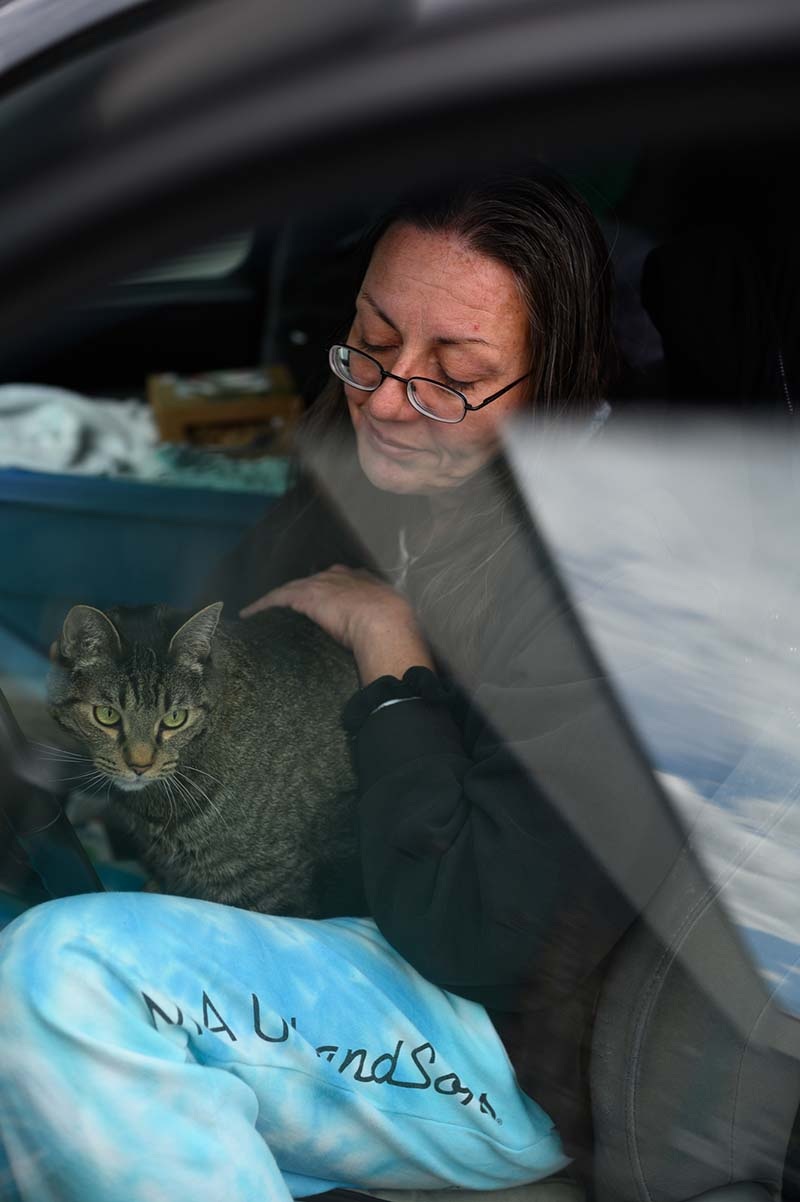
Rachel Snyder with her cat, Tinder.
Thanks to a three-year, $600,000 grant from the Colorado Health Foundation to The Joseph Center, the Golden Girls shelter recently expanded, adding a third bedroom, kitchen, shower and laundry room. The capacity doubled from four to eight women at one time. That tiny old television was just replaced with a newer, flat-screen model, and there’s some new furniture as well.
The Golden Girls program is designed to allow women to stay for up to six months. While the women are at the shelter, Joseph Center staff members help them complete paperwork so they can receive Social Security payments, pensions or alimony, and apply for affordable housing. They are provided medical care, counseling, assistance finding jobs, and whatever else they might need to gain some stability.
It is not often an easy transition. Of the 30 or so women who have moved on from the Golden Girls program, around a dozen have found apartments or moved in with family members. Some have gone back to living on the streets.
“We are trying to keep them off the streets. It isn’t safe for them there,” Tarr says, speaking from her tiny windowless office where her desk is ruffled with “to do” sticky notes and decorated with painted tchotchkes made by grateful women in the next-door Golden Girls living space.
Tarr rifles through a file drawer stuffed with manila envelopes—each one a condensed saga of a woman who doesn’t have a home.
One folder tells the story of a diabetic woman who had to have a leg amputated. She came home from the hospital to find her possessions sitting on the street in front of her rental apartment.
Another details the problems of an 83-year-old woman who was kicked out of her home because family members had been secretly draining her bank account instead of paying the bills.
Another woman was living in a hotel with an abusive son and had to leave when the abuse became intolerable.
A woman with leukemia couldn’t afford to pay for a place to live after she used up her meager savings to pay for health care.
Some of the women who come to Golden Girls had lived in riverside camps. Some had been staying in their vehicles. A number had been in shelters where they could sleep but had to leave during the day.
Tarr recognizes that Golden Girls can only scratch the surface of the need. In Mesa County, there is a three-year waiting list for subsidized housing. “Affordable rentals—there is no such thing,” Tarr says.
Behind the door that, for safety and security purposes, is always kept locked and bears a “No entry” sign, the women who currently call the Golden Girls shelter home are living in sometimes symbiotic, sometimes touchy close quarters. Bullying and physical fighting, though uncommon, are reasons for expulsion. (One of the women interviewed for this story in early September was asked to leave the shelter a month or so later, due to repeated disruptive behavior. She’s living on the streets again.)
“I don’t think any six women could live together and not fight some,” says Shannon Maxwell. “But we try not to talk back when we are upset. We are good at laughing a lot.”
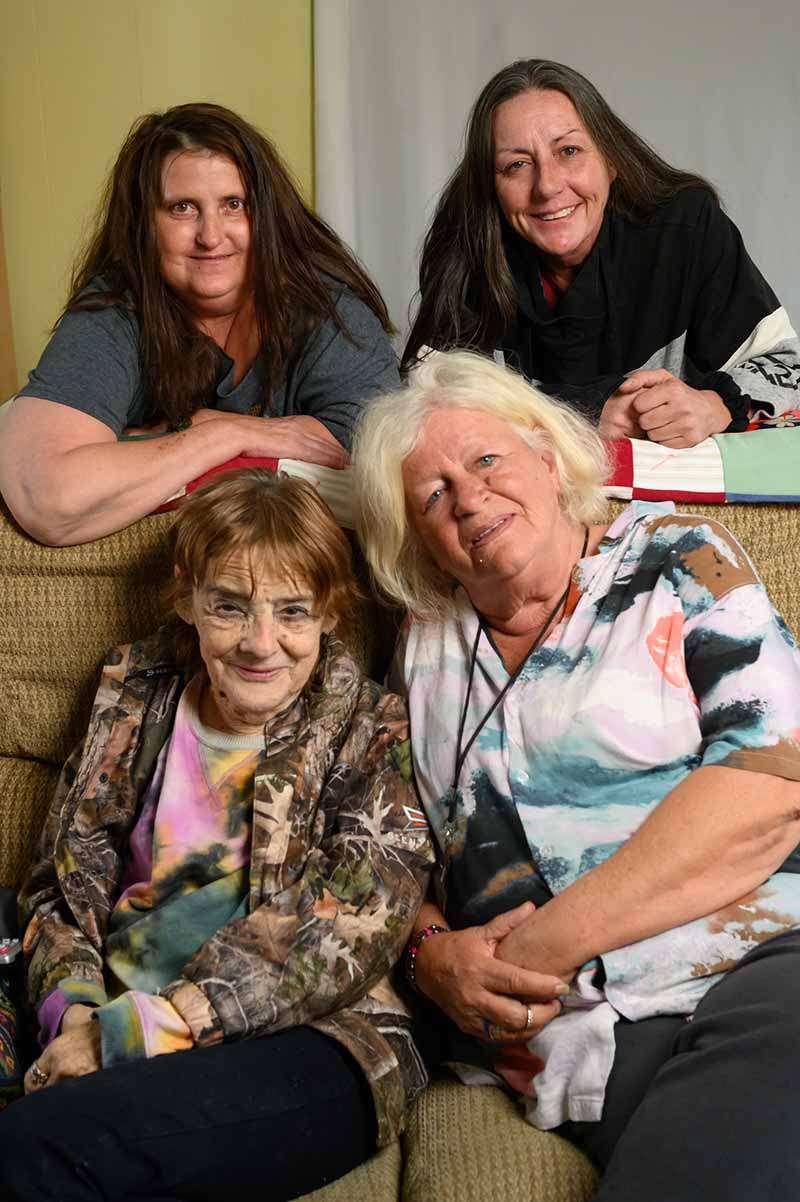
Top, l. to r.: Shannon Maxwell and Rachel Snyder. Bottom, l. to r.: Valerie Azeltine and Kris Quinn, another shelter resident.
Valerie Azeltine says she spent a month living in a hotel after her daughter brought her to Grand Junction and then left town. At The Joseph Center, she has been receiving care for medical problems, something she did not have access to before coming here.
“I hope to get a place soon,” she says quietly.
Maxwell has been living at Golden Girls since Christmas after leaving an abusive partner and living on the streets. She says she had been staying in a shelter at night, and returned one evening to find that she was locked out—the shelter was suddenly in quarantine due to COVID-19. She ended up staying in a tent.
“It was cold,” is what she remembers most about that experience.
Maxwell uses a rolling walker like a wheelchair because rheumatoid arthritis has made it difficult for her to walk.
“I don’t know what I’d do without this place,” says the former school cook. “It has helped me a lot. I get to see a counselor.”
Ona Ridgway, a psychiatric nurse practitioner who works with many of the Golden Girls residents through the Pathways Family Wellness Clinic in Grand Junction, says a lot of the women feel empowered by just having someone listen to their problems. She and a team of student nurses from Colorado Mesa University see Golden Girls shelter residents weekly to listen to residents’ concerns, and to check physical problems that most commonly include tobacco-related lung conditions, diabetes, substance abuse, heart disease and hypertension.
Last year, Ridgway provided care for 124 unhoused people over the age of 50 at Pathways. Forty-six of them were women. So far this year, 97 unhoused people have sought help, and 43 of those were women over the age of 50.
The Colorado Coalition for the Homeless’s annual Point-in-Time Count in January 2022 found 74 women staying in Mesa County shelters or transitional housing on one night, or 35% of the total number for the county. Of the 54 counties surveyed earlier this year in the study, Mesa County had the highest overall rate of homelessness in the state.
These numbers come into focus in a Grand Junction park on a recent early fall day, where unhoused people are situated in the grass with their possessions piled besides them.
Pamela Boyd is one of them. She has a van. She has been living on the streets or out of the van for the past two years, with a brief hiatus at Golden Girls while she recovered from a shoulder surgery.
She says the Golden Girls program was not for her: “I’ve been a loner most of my life, and I just couldn’t get away from the other women there.”
Her vehicle is parked next to another van belonging to Tarr’s mother, Cindy Steele. She works with a program called Solidarity Not Charity. Steele makes the rounds of parks and tent camps distributing food, adult diapers, and Narcan for drug overdoses.
“I am what they call ‘boots on the ground,’” Steele says.
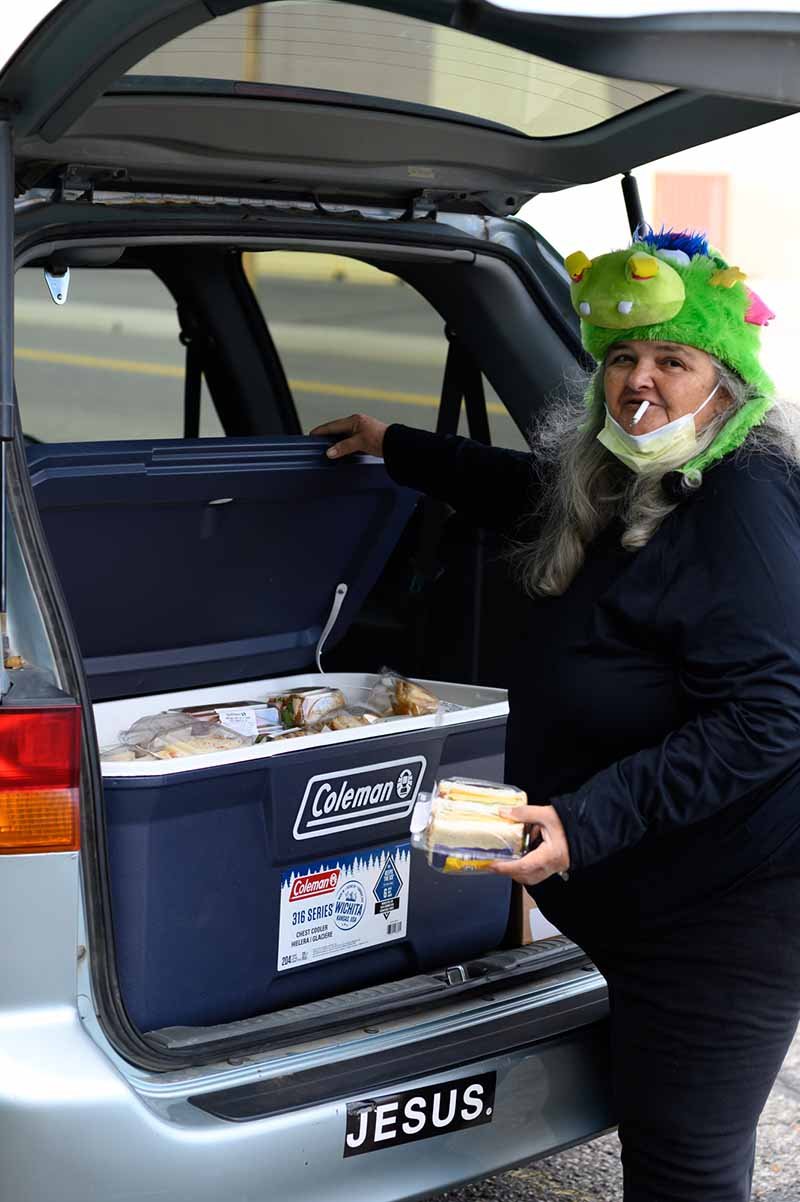
Cindy Steele with some of the food she distributes to unhoused women in the Grand Junction area.
Steele says there are all-female camps along the river where women have banded together for protection. She knows where other women tend to stay and she keeps tabs on them for her daughter. She lets these women know about the Golden Girls, though she also knows that she will never be able to convince some of them to go into such a program.
“We call those ‘lifers.’ They can’t be contained by four walls. They just want to live outdoors,” she says.
Boyd says that would describe her. She thinks longingly of a few years when she lived along the Colorado River growing strawberries and potatoes. She is proud of her self-sufficiency.
There are only a few things she misses from living in the shelter: “I would like an oven to be able to bake me a little cake now and then,” she says.
On this day, there is no cake, but about 75 people come to the park for free hot dogs and hamburgers. A third of them are women. One of them is Francis, a 61-year-old who hasn’t had a home since her mother died, the family home was sold and the resulting inheritance was split between eight children. Francis’ portion wasn’t enough to rent another place.
She says she would move into Golden Girls, but she has a disabled son, two grandchildren and two dogs living with her in her vehicle. “If I had the opportunity for housing, I would take it,” she says.
Highline says that some of the women who have lived at Golden Girls and moved on maintain some connections to the shelter, either through coming back for meals or other support services. Some return for visits because they miss their friends. On an unseasonably warm day in early November, two former shelter residents—now with their own apartments—were back at Golden Girls, drinking coffee and reminiscing. They both admitted to feeling lonely in their new housing, and returned to the shelter often to visit and reconnect.
Azeltine may be one of those if she manages to find a place to live. She says she will be pleased to have an affordable place of her own, but she recognizes there will be a downside for her.
“I will miss the Golden Girls,” she says. “I have good friends here.”
